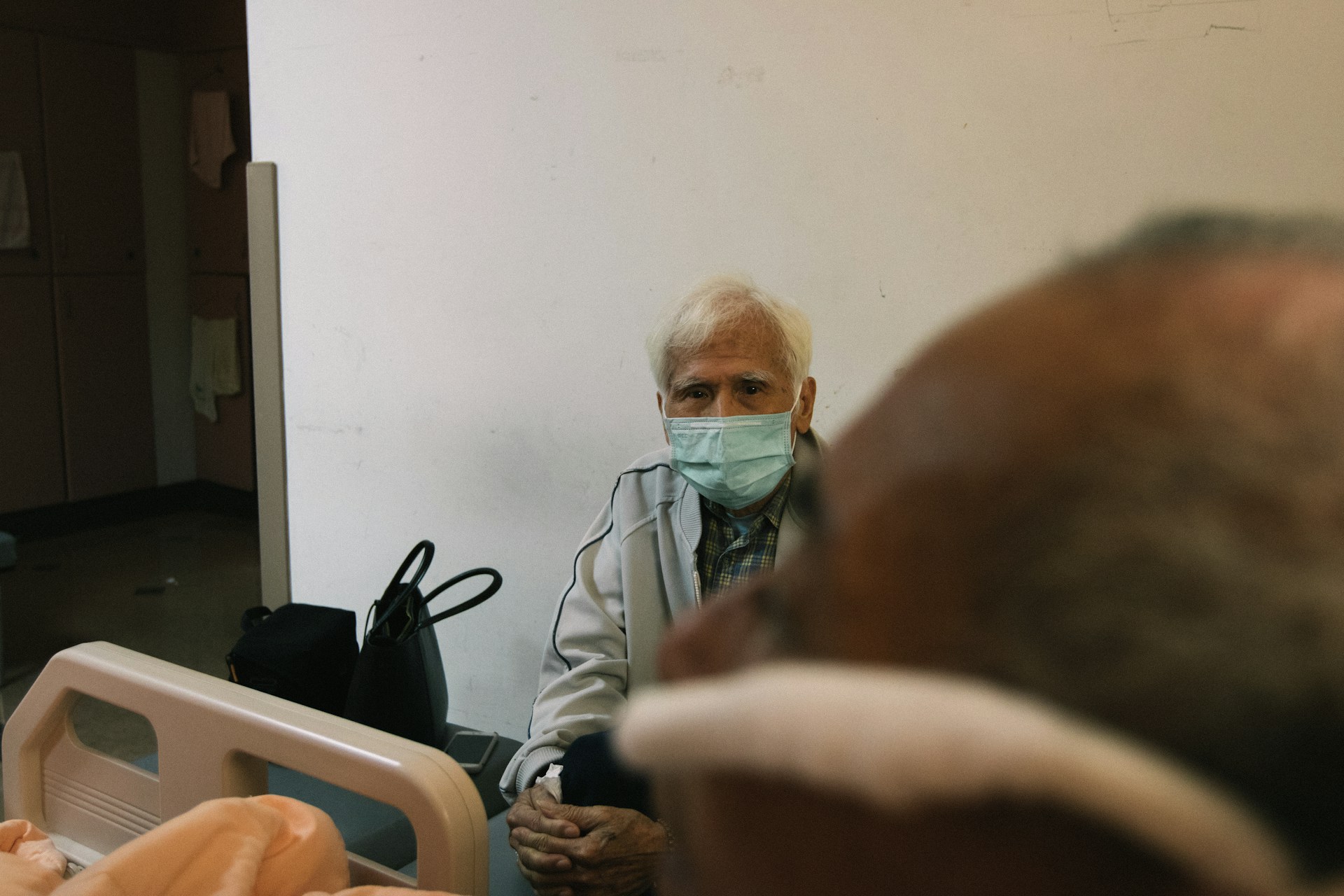Association between Energy and Macronutrient Intake and Sleep Duration with Nutritional Status of New Students of the Faculty of Public Health, Universitas Airlangga during Online Courses
Hubungan Asupan Energi dan Zat Gizi Makro serta Durasi Tidur dengan Status Gizi Mahasiswa Baru Fakultas Kesehatan Masyarakat Universitas Airlangga selama Kuliah Online

Downloads
Background: Learning from home is a government policy to decrease the number of COVID-19 in Indonesia. This condition requires university students to adapt to new technology that has the potential to affect sleep and consumption patterns that will influence their nutritional status.
Objectives: The purpose of the study was to analyze the relationship between energy, macro-nutrient consumption, and sleep duration with the nutritional status of new students of FKM UNAIR.
Methods: The research was an observational study with a cross-sectional design. A total of 55 students were randomly selected to be the research sample. Research data collection was done by using Google Forms. Research data were analyzed using the Spearman correlation test.
Results: Most of the new FKM UNAIR students were female (87.3%), had sleep duration <7 hours/day (56.4%), and had normal nutritional status (69.1%). Most of the respondents had less intake of energy (47.3%), fat (54.5%), carbohydrates (60%), and excess protein intake (52.7%). The statistical tests showed that energy intake (p-value = 0.426), macronutrients including protein (p-value = 0.170), fat (p-value = 0.129), and carbohydrates (p-value = 0.884), also sleep duration (p-value = 0.190) was not related to the nutritional status of new students of FKM UNAIR.
Conclusions: There was no correlation between energy intake, macronutrients, and sleep duration with the nutritional status of new FKM UNAIR students. Instead, students should pay attention to the duration of sleep and intake following the principles of balanced nutrition.
Diananda, A. Psikologi Remaja dan Permasalahannya. Jurnal Istighna 1, 116–133 (2018).
World Health Organization (WHO). Health for the World's Adolescents: A Second Chance in the Second Decade. (2014).
The Ministry of Health of Indonesia. Regulation of the Minister of Health of the Republic of Indonesia Number 2 of 2020 concerning Children's Anthropometric Standards. (2020).
The Ministry of Health of Indonesia. Adolescent Reproductive Health Situationst1. https://pusdatin.kemkes.go.id/resources/download/pusdatin/infodatin/infodatin-reproduksi-remaja.pdf (2017).
Hulukati, W. & Djibran, Moh. R. Analisis Tugas Perkembangan Mahasiswa Fakultas Ilmu Pendidikan Universitas Negeri Gorontalo. Jurnal Bikoetik 2, 73–114 (2018).
Septikasari, M. Status Gizi Anak dan Faktor yang Mempengaruhi. (UNY Press, 2018).
The Ministry of Health of Indonesia. Basic Health Research (Riskesdas) 2018. http://www.depkes.go.id/resources/download/infoterkini/materi_rakorpop_20 18/Hasil%20Riskesdas%202018.pdf (2018).
Ratsavong, K. et al. Are Dietary Intake and Nutritional Status Influenced By Gender? The Pattern Of Dietary Intake In Lao PDR: A Developing Country. Nutrition Journal 19, 1–16 (2020).
Kunto, Y. S. & Bras, H. Ethnic Group Differences in Dietary Diversity of School-Aged Children in Indonesia: The Roles of Gender and Household SES. Food and Nutrition Bulletin 40, 182–201 (2019).
Asghar Rashidi, A. et al. Dietary Intake and Its Relationship to Different Body Mass Index Categories: A Population-Based Study ARTICLE INFORMATION ABSTRACT. JRHS Journal of Research in Health Sciences vol. 18 www.umsha.ac.ir/jrhs (2018).
Jaiswal, S. J. et al. Association of Sleep Duration and Variability With Body Mass Index: Sleep Measurements In a Large US Population of Wearable Sensor Users. JAMA internal medicine 180, 1694–1696 (2020).
Rajabi, H., Sabouri, M. & Hatami, E. Associations between Physical Activity Levels with Nutritional Status, Physical Fitness and Biochemical Indicators in Older Adults. Clinical nutrition ESPEN 45, 389–398 (2021).
Arieska, A. P. & Herdiani, N. Hubungan Pengetahuan dan Pola Konsumsi Dengan Status Gizi pada Mahasiswa Kesehatan. Medical Technology and Public Health Journal (MTPH Journal) | 4, 203 (2020).
Wulandari, A., Dhenok Widari, D. & Muniroh, L. Hubungan Asupan Energi, Stres Kerja, Aktifitas Fisik, dan Durasi Waktu Tidur dengan IMT pada Manajer Madya Dinas Pemerintah Kota Surabaya. Amerta Nutr 3, 40–45 (2019).
Romieu, I. et al. Energy Balance and Obesity: What Are The Main Drivers? Cancer Causes and Control 28, 247–258 (2017).
Mawitjere, M. C. L. et al. Gambaran Asupan Zat Gizi Makro Mahasiswa Semester IV Fakultas Kesehatan Masyarakat Universitas Sam Ratulangi saat Pembatasan Sosial Masa Pandemi COVID-19. Jurnal Kesmas 10, 1–11 (2021).
Damayanti, R. E., Sumarmi, S. & Mundiastuti, L. Hubungan Durasi Tidur dengan Kejadian Overweight dan Obesitas pada Tenaga Kependidikan di Lingkungan Kampus C Universitas Airlangga Amerta Nutr 3, 89–93 (2019).
Maharani, R. I. Hubungan Durasi Tidur sebagai Faktor Risiko terhadap Kejadian Obesitas pada Anak Usia 3-9 Tahun: Literature Review. https://erepository.uwks.ac.id/10795/ (2022).
Putra T.E. Hubungan antara Durasi dan Kualitas Tidur dengan Overweight pada Mahasiswa Universitas Alma Ata Yogyakarta. (2017).
Rachmadianti, D. & Deviyanti Puspita, I. Korelasi antara Asupan Protein, Serat dan Durasi Tidur dengan Status Gizi Remaja. Jurnal Riset Gizi 8, 85–89 (2020).
The Ministry of Education and Culture of Indonesia. Surat Edaran Nomor 15 Tahun 2020 tentang Pedoman Penyelenggaraan Belajar dari Rumah Dalam Masa Darurat Penyebaran Corona Virus Disease (COVID-19). (2020).
Putri, A. S., Ichsan, B., Dasuki, S. & Agustina, T. Hubungan Pola Tidur dan Tingkat Stres dengan Prestasi Mahasiswa FK UMS Selama Perkuliahan Online. 158–165 (2021).
Noviasty, R. & Susanti, R. Perubahan Kebiasaan Makan Mahasiswa Peminatan Gizi selama Masa Pandemi COVID-19. Jurnal Kesehatan Masyarakat Mulawarman 2, 90–99 (2020).
Ughude, R. U. et al. Gambaran Pola Makan Mahasiswa FKM Unsrat Semester IV saat Pembatasan Sosial Masa Pandemi COVID-19. Jurnal KESMAS vol. 10 (2021).
Nabawiyah, H., Khusniyati, Z.A., Damayanti, A.Y. & Naufalina, M.D. Hubungan Pola Makan, Aktivitas Fisik, Kualitas Tidur dengan Status Gizi Santriwati di Pondok Modern Darussalam Gontor Putri 1. Darussalam Nutrition Journal 5, 78-89 (2021).
Kurniawati, Y., Fakhriadi, R. & Yulidasari, F. Hubungan Antara Pola Makan, Asupan Energi, Aktivitas Fisik, dan Durasi Tidur dengan Kejadian Obesitas pada Polisi. Jurnal Publikasi Kesehatan Masyarakat Indonesia 3, 112-117 (2016).
Mufidah, R. & Soeyono, R. D. Pola Makan, Aktivitas Fisik, dan Durasi Tidur terhadap Status Gizi Mahasiswa Program Studi Gizi Unesa. Jurnal Gizi Unesa vol. 01 (2021).
Setiawati, F. S. Hubungan Pengetahuan tentang Gizi Seimbang, Kebiasaan Olahraga, Durasi Tidur, Peer Influence, Intensitas Penggunaan Media Sosial, dan Kebiasaan Konsumsi Fast Food dengan Status Gizi Remaja di SMAN 6 Surabaya. (2019).
Supit, E.D., Mayulu, N., Bolang, A.S.L. & Kawengian, S. Aktivitas Fisik dan Status Gizi Mahasiswa saat Pandemi COVID-19. Jurnal Biomedik 13, 180-184 (2021).
Saputri, W. Hubungan Aktivitas Fisik dan Durasi Tidur dengan Status Gizi pada Remaja di SMPN 2 Klego Boyolali. (2018).
Fibriani, D. Hubungan Kualitas Tidur dengan Status Gizi pada Mahasiswa Fakultas Kedokteran Universitas Brawijaya. (2019).
Rathod, S. et al. Sleep Duration and Its Association with Obesity and Overweight in Medical Students: A Cross-Sectional Study. National Journal of Physiology, Pharmacy, and Pharmacology 8, 113–117 (2018).
Corríªa, M. M., Borges, M. A. de S. & de Oliveira, E. R. A. Sleep Duration and Overweight: Is There a Relationship in Adolescence?. Revista Brasileira de Epidemiologia 24, (2021).
National Sleep Foundation (NSF). How Much Sleep Do We Need?. https://www.sleepfoundation.org/how-sleep-works/how-much-sleep-do-we-really-need (2010).
Wang, H. et al. The Relationship between Sleep Duration and Obesity Risk Among School Students: A Cross-Sectional Study In Zhejiang, China. Nutrition and Metabolism 15, (2018).
Min, C. et al. The Association between Sleep Duration, Sleep Quality, and Food Consumption In Adolescents: A Cross-Sectional Study Using the Korea Youth Risk Behavior Web-Based Survey. BMJ Open 8, (2018).
Muhammad, H. F. L. et al. The Impact of Sleep Quality and Duration on Leptin, Appetite, and Obesity Indices in Adults. Medical Journal of Indonesia 29, 417–421 (2020).
Rahmawati, T. Hubungan Asupan Zat Gizi dengan Status Gizi Mahasiswa Gizi Semester 3 STIKES PKU Muhammadiyah Surakarta. PROFESI 14, 49–57 (2017).
Larasati, D. A. Pengaruh Stress dan Asupan Energi terhadap Status Gizi pada Mahasiswi Tahun Pertama Perkuliahan di Fakultas Kedokteran Universitas Brawijaya Malang. (2018).
Prycilla Veronika, A., Puspitawati, T. & Fitriani, A. Associations Between Nutrition Knowledge, Protein-Energy Intake and Nutritional Status of Adolescents. Journal of Public Health Research vol. 10 (2021).
Zhao, J. et al. Secular Trends in Energy and Macronutrient Intakes and Distribution among Adult Females (1991–2015): Results from the China Health and Nutrition Survey. Nutrients 10, (2018).
Nicholaus, C., Martin, H. D., Kassim, N., Matemu, A. O. & Kimiywe, J. Dietary Practices, Nutrient Adequacy, and Nutrition Status among Adolescents in Boarding High Schools in the Kilimanjaro Region, Tanzania. Journal of Nutrition and Metabolism 2020, 1–14 (2020).
Braun, H. et al. Energy Needs in Sports. Ernahrungs Umschau 66, 146–153 (2019).
Ramadhan, T. A. & Ismawati, R. Kaitan Kebiasaan Sarapan dan Asupan Zat Gizi dengan Status Gizi Mahasiswa Gizi UNESA Angkatan 2017. Jurnal Gizi Universitas Negeri Surabaya 1, 53–59 (2021).
Copyright (c) 2023 Amerta Nutrition

This work is licensed under a Creative Commons Attribution-ShareAlike 4.0 International License.
AMERTA NUTR by Unair is licensed under a Creative Commons Attribution-ShareAlike 4.0 International License.
1. The journal allows the author to hold the copyright of the article without restrictions.
2. The journal allows the author(s) to retain publishing rights without restrictions
3. The legal formal aspect of journal publication accessibility refers to Creative Commons Attribution Share-Alike (CC BY-SA).
4. The Creative Commons Attribution Share-Alike (CC BY-SA) license allows re-distribution and re-use of a licensed work on the conditions that the creator is appropriately credited and that any derivative work is made available under "the same, similar or a compatible license”. Other than the conditions mentioned above, the editorial board is not responsible for copyright violation.












































